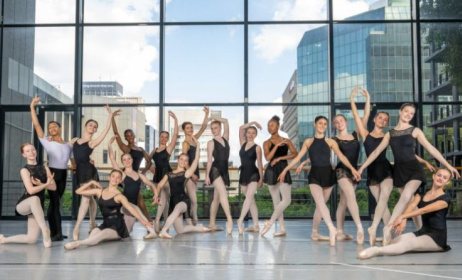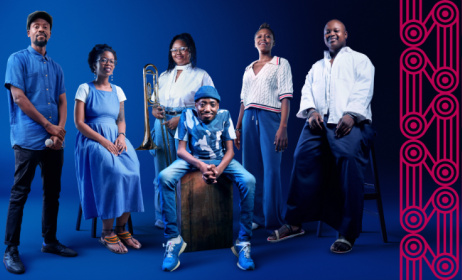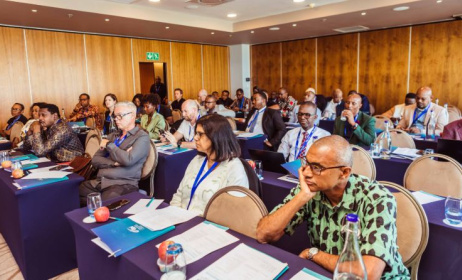Dumama + Kechou: The duo that went on a rare musical excavation
South Africa's folkloric spiritual jazz duo Dumama + Kechou (born Gugulethu Duma and Kerim Melik Becker) produces music that is almost meant for another era, yet it's rooted in the present with a narrative that carries the weight of oppressive history.
 Future folk duo Dumama + Kechou.
Future folk duo Dumama + Kechou.
They exude a vibrant force and strong harmony within a deep cultural resonance. Their perceptions were shaped on opposite sides of the globe: vocalist Dumama has roots in rural Eastern Cape in South Africa, while multi-instrumentalist Kechou is of Algerian-German descent, but born and raised in Germany. His non-alignment with the monolithic cultural context of the West has always pushed him to search deeply for some sense of belonging.
The duo met through a mutual friend and musician who believed Dumama and Kechou’s individual paths could come together "to break down the predisposed barricades of prejudice and alienation created by imperial, colonial and patriarchal thought and action,” Kechou says.
After pursuing his studies in African music with a particular interest to North African instrumentation, he found himself critiquing the repressive dynamics that surround the framing of African music. On the other hand, Dumama draws heavy influence from celebrated uhadi player and instrument builder Madosini Latozi Mpahleni, who is well known for her stage genius and improvisational ability. It's Madosini’s teachings, which include ukombela, a traditional practice of creating impromptu chants, that have shaped Dumama's craft.
The duo's musical journey has been about gravitating towards their own centres and back out into the world through a complex sonic labyrinth filled with artistic flow, interaction and engagement. Drawing inspiration from various urban realities, sounds and perspectives, the duo has now settled on calling their primary sound 'future folk'. But there is tension here.
"The alienation goes both ways though," Kechou says. "As much as we have a hard time grounding and existing in the urban West we also feel a strong sense of non-belonging within more rural and culturally integral parts of our communities. This gap within your own existence as a mirror of the sociocultural gap between communities all around the globe pushes us to become mediators and bridges.”
Dumama and Kechou's inimitable compositions rely on an organic process of creation infused with revolutionary zest, improvisation, and the vocals and chants of Dumama in her native Xhosa language. The music is not lyrically pervaded by design, yet Kechou – who has spent the past five years producing Afro-fusion music experiments in Germany, Uganda, Zimbabwe and South Africa – seamlessly delivers multi-layered instrumentation. With electronic loops, samples and warping traditional sounds, he leads the curious ear into deep contemplation.
The audience, too, is crucial in informing how the duo delivers its art. “Each show is a surprise and an opportunity to connect deeper with the instruments,” Dumama said in a previous interview.
Under the auspices of Mushroom Hour Half Hour, a South African alternative-focused imprint founded in Johannesburg, the duo released in March their debut album Buffering Juju, an eight-track sound journey that was primarily recorded during a two-week residency that Dumama and Kechou attended. On their latest single, ‘Leaving Prison’, a woman leaving a prison, immersed in the disturbing social landscape, captures the angst of the modern world and repels the fecklessness that colonialism built. The project puts pain into perspective: “There is clearly an imbalance that needs our attention,” Dumama says. “Leaving prison can support us as we transcend the limitations of what we’ve been taught.”
She also shares some thoughts on an earlier single off the album, titled ‘Mother Time’: “It was a result of ongoing improvisations at my performances with Kechou. Every performance, something new and memorable would emerge. It started out as a sort of interlude, where I was always channelling an elder storyteller woman who was somewhat eerie and deeply intense, going into this 'nothingness far worse than nothing'.”
There’s also a unity of purpose that, on selected tracks, brings together the talents of trombonist Siya Makuzeni, pianist Nobuhle Ashanti, vocalist Odwa Bongo and vibraphonist Dylan Greene. The album also features contributions from clarinet player Angel Bat Bawid and bassist Shane Cooper as well as synthesisers by Dion Monti.
With all of this, the group has duly attracted the attention of respected figures like renowned British DJ and tastemaker Gilles Peterson. When asked what the future of experimental music in South Africa holds, the duo says: “The future will show, provide and hold. We stay open. We’ll keep making contemplative music that attempts to process the mess and celebrate the changes.”


































Comments
Log in or register to post comments